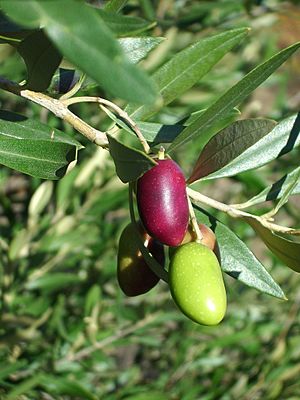Lucques facts for kids
Quick facts for kids Lucques |
|
|---|---|

Lucques olives ripening on the tree
|
|
| Olive (Olea europaea) | |
| Color of the ripe fruit | Green |
| Also called | Lucquoise, Olivier Odorant, Oliverolle |
| Origin | France |
| Notable regions | Languedoc |
| Hazards | Olive fruit fly, sooty mold, Verticillium dahliae etc. |
| Use | Oil and table |
| Oil content | Medium |
| Fertility | Self-sterile |
| Growth form | Spreading |
| Leaf | Elliptic-lanceolate |
| Weight | Medium |
| Shape | Elongated |
| Symmetry | Asymmetrical |
The Lucques is a special type of olive tree, also known as a cultivar. It is mostly grown in a region called Languedoc in France. People mainly use Lucques olives as a green table olive, which means they are eaten whole. These olives can also make excellent olive oil, but it's a bit tricky to get the oil out. Even though the tree can be affected by some pests, it handles cold weather and dry conditions quite well.
Contents
Where Do Lucques Olives Grow?
The name "Lucques" comes from the idea that this olive first grew in a place called Lucca in Italy. However, today it is most famous in southern France. You'll find it especially in the Languedoc-Roussillon region, in areas like Aude and Hérault. Since 2017, its growth in Europe is protected by a special rule called a "protected designation of origin" (PDO). This means only olives from certain areas can be called Lucques. You can also find Lucques olives growing in North Africa, Turkey, the United States, and Australia.
Other Names for Lucques Olives
In different places, people call this olive by other names. Some common ones include Lucquoise or Luquoise, Oliva Lucchese, Oliverolle, Olivier de Lucques, Olivier Odorant, and Plant du Languedoc.
What Makes Lucques Olives Special?
The Lucques olive tree is strong and grows in a wide, spreading shape, almost like a vase or an open umbrella. Its leaves are shaped like long ovals. The olives themselves are medium to heavy. They have a unique, long, and uneven shape. One end is pointy, and the other is flat. The pit inside is also pointy at both ends and has very few grooves.
These olive trees start producing fruit early, but the olives ripen late in the year. Farmers usually pick them at the end of October or beginning of November, when the skin is still light green. The olives become fully ripe in December, turning a dark purple color.
How Are Lucques Olives Used?
The Lucques olive is mostly enjoyed as a green table olive. People love its meaty and sweet taste. Some say it tastes like fresh almonds or avocados. It is a very popular olive among food lovers.
While it's great for eating, it can also be used to make olive oil. The oil from Lucques olives is excellent quality, but it's hard to get a lot of oil from them. The oil has a smell that some describe as "almond," "green apple," or "tomato." The taste is sweet, sometimes even very sweet.
Growing Lucques Olives
The Lucques olive tree can produce a lot of olives. However, it needs good soil and regular watering to grow well and give a high yield. This olive tree is "self-sterile," which means it needs pollen from other olive trees to produce fruit. So, other types of olive trees must be planted nearby to help it grow.
The Lucques olive tree can be affected by certain pests. These include the olive fruit fly, sooty mold (a type of fungus), and a disease caused by Verticillium dahliae. But, the tree is quite good at handling cold and dry weather. Even so, many trees were lost in the very cold winter of 1956 in the South of France.
 | Emma Amos |
 | Edward Mitchell Bannister |
 | Larry D. Alexander |
 | Ernie Barnes |

